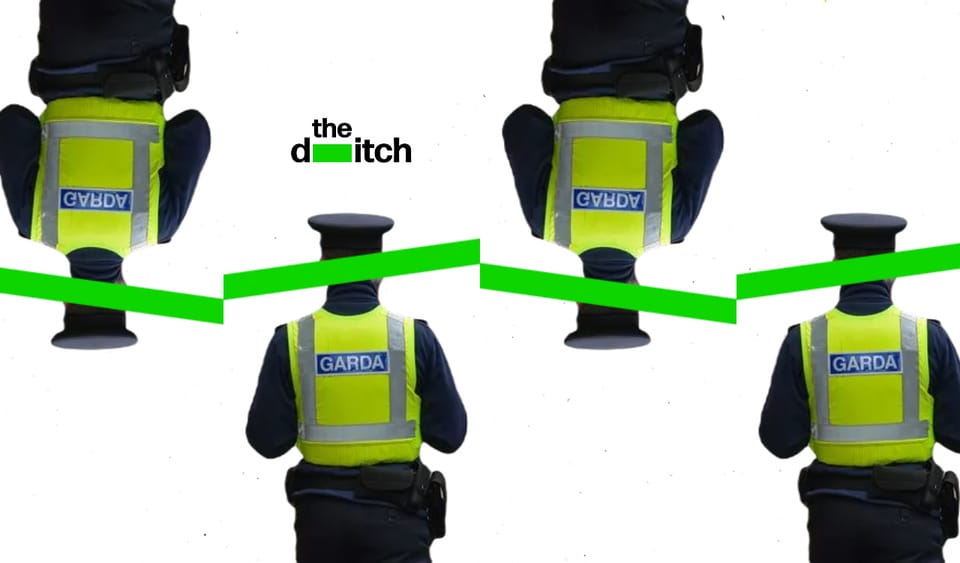A senior garda gave contradictory statements during an internal probe into claims he failed to adequately investigate corruption allegations against an Athlone garda.
Chief superintendent Aidan Glacken first said he sought the phone records of a garda accused of complicity in the drug trade to investigate these claims – but later changed his story to claim he looked for the records over a billing issue.
The records in question showed ex-garda George Garvey exchanged calls and texts with an alleged drug dealer more than 1,600 times during a 10-week period in 2010. The Ditch reported last week that Garvey was named in a 2014 intelligence file linking three Athlone-based gardaí to drug dealing in the midlands.
Glacken now refuses to explain his conflicting statements.
Meanwhile The Ditch has seen an expert report written by a British former police chief inspector, which suggests senior gardaí did not properly investigate misconduct allegations against Glacken.
‘I’m almost certain’
On February 20, 2015 chief superintendent Aidan Glacken was questioned by detective inspector Michael Coppinger and detective superintendent Declan Mulcahy.
The pair questioned him on 2014 whistleblower claims that Glacken failed to properly investigate allegations that Athlone-based garda George Garvey was in a relationship with a suspected heroin dealer and providing intelligence to criminals involved in the drug trade.
The allegations against Glacken focused on his handling of a 9 September, 2010 report he received from sergeant Andrew Haran, which made serious allegations of criminality against Garvey.
In his 2015 interview Glacken said he had sought phone records to help establish the claim that Garvey was using a garda-issued mobile phone to communicate with the suspected heroin dealer.
Glacken explained why he sought these records and said it was because he wanted to investigate the claims.
“To try and establish the veracity of the information I sought the printout of all phone traffic to the drug unit official phone,” continuing, “I made application to telecoms at garda headquarters. At the time I checked these printouts for a pattern, and I asked sergeant Haran to attempt to establish the relevant numbers that may support the contention that garda Garvey may have been compromised,” claimed Glacken in the interview.
Almost three years later Glacken changed his reason for requesting the phone records.
In a 2018 interview with assistant commissioner Anne Marie McMahon, Glacken claimed he had actually sought “billing records” over a “billing issue”.
He said he requested these records just one day before he was handed a report on Garvey.
“I did get the phone records and I'm almost certain it was in relation to a billing issue but I will check that. I have now checked my records and I made an application to garda telecommunications section on 8 September, 2010 for billing records for the drug unit phone (because of cost etc),” said Glacken, according to a transcript of his statement dated 29 January, 2018.
The allegations against Garvey were revisited in 2015 after an internal investigation during which it was discovered that he had communicated with the alleged drug dealer through calls and texts more than 1,600 times.
Glacken declined to comment when asked by The Ditch why he initially said he sought phone records to establish the strength of the claims against Garvey but later claimed that they were requested earlier because of a billing issue.
Investigation was a ‘foregone conclusion’
The Ditch has seen a report compiled by a British police officer that included an analysis of An Garda Síochána’s (AGS) handling of misconduct allegations against Glacken.
In 2019 lawyers acting for garda whistleblower Nicky Keogh asked former police detective chief inspector Stephen Vernon Christopher to compile an expert report into how AGS handled his complaints.
Christopher, who served as a police officer for almost three decades and headed a professional standards unit, could only draft a preliminary report because AGS didn’t disclose all relevant files.
In his 39-page report, the former chief inspector heavily criticised how AGS had handled its investigations, including Glacken’s 2015 interview.
“The format, style and detailed content of the (Glacken) statement makes it difficult to believe that it had not been largely pre-prepared before the arrival of detective superintendent Mulcahy and detective inspector Coppinger,” said Christopher.
“This raises the issue of when chief superintendent Glacken was 'previously advised' of the allegations by the investigation team… and indicate that the approach adopted by detective superintendent Mulcahy and detective inspector Coppinger was a foregone conclusion, negating any need for a challenging interview into the allegations against chief superintendent Glacken, thus undermining the credibility of the enquiry,” added Christopher in his report.
Chief superintendent Aidan Glacken was the most senior officer at Athlone garda station from 2005 until 2012. He is now head of policing operations in counties Sligo and Leitrim.


